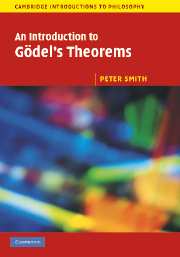Book contents
- Frontmatter
- Contents
- Preface
- 1 What Gödel's Theorems say
- 2 Decidability and enumerability
- 3 Axiomatized formal theories
- 4 Capturing numerical properties
- 5 The truths of arithmetic
- 6 Sufficiently strong arithmetics
- 7 Interlude: Taking stock
- 8 Two formalized arithmetics
- 9 What Q can prove
- 10 First-order Peano Arithmetic
- 11 Primitive recursive functions
- 12 Capturing p.r. functions
- 13 Q is p.r. adequate
- 14 Interlude: A very little about Principia
- 15 The arithmetization of syntax
- 16 PA is incomplete
- 17 Gödel's First Theorem
- 18 Interlude: About the First Theorem
- 19 Strengthening the First Theorem
- 20 The Diagonalization Lemma
- 21 Using the Diagonalization Lemma
- 22 Second-order arithmetics
- 23 Interlude: Incompleteness and Isaacson's conjecture
- 24 Gödel's Second Theorem for PA
- 25 The derivability conditions
- 26 Deriving the derivability conditions
- 27 Reflections
- 28 Interlude: About the Second Theorem
- 29 µ-Recursive functions
- 30 Undecidability and incompleteness
- 31 Turing machines
- 32 Turing machines and recursiveness
- 33 Halting problems
- 34 The Church–Turing Thesis
- 35 Proving the Thesis?
- 36 Looking back
- Further reading
- Bibliography
- Index
29 - µ-Recursive functions
Published online by Cambridge University Press: 05 June 2012
- Frontmatter
- Contents
- Preface
- 1 What Gödel's Theorems say
- 2 Decidability and enumerability
- 3 Axiomatized formal theories
- 4 Capturing numerical properties
- 5 The truths of arithmetic
- 6 Sufficiently strong arithmetics
- 7 Interlude: Taking stock
- 8 Two formalized arithmetics
- 9 What Q can prove
- 10 First-order Peano Arithmetic
- 11 Primitive recursive functions
- 12 Capturing p.r. functions
- 13 Q is p.r. adequate
- 14 Interlude: A very little about Principia
- 15 The arithmetization of syntax
- 16 PA is incomplete
- 17 Gödel's First Theorem
- 18 Interlude: About the First Theorem
- 19 Strengthening the First Theorem
- 20 The Diagonalization Lemma
- 21 Using the Diagonalization Lemma
- 22 Second-order arithmetics
- 23 Interlude: Incompleteness and Isaacson's conjecture
- 24 Gödel's Second Theorem for PA
- 25 The derivability conditions
- 26 Deriving the derivability conditions
- 27 Reflections
- 28 Interlude: About the Second Theorem
- 29 µ-Recursive functions
- 30 Undecidability and incompleteness
- 31 Turing machines
- 32 Turing machines and recursiveness
- 33 Halting problems
- 34 The Church–Turing Thesis
- 35 Proving the Thesis?
- 36 Looking back
- Further reading
- Bibliography
- Index
Summary
This chapter introduces the notion of a µ-recursive function – which is a very natural extension of the idea of a primitive recursive function. Plausibly, the effectively computable functions are exactly the µ-recursive functions (and likewise, the effectively decidable properties are those with µ-recursive characteristic functions).
Minimization and µ-recursive functions
The primitive recursive functions are the functions which can be defined using composition and primitive recursion, starting from the successor, zero, and identity functions. These functions are computable. But they are not the only computable functions defined over the natural numbers (see Section 11.5 for the neat diagonal argument which proves the point). So the natural question to ask is: what other ways of defining new functions from old can we throw into the mix in order to get a broader class of computable numerical functions (hopefully, to get all of them)?
As explained in Section 11.4, p.r. functions can be calculated using bounded loops (as we enter each ‘for’ loop, we state in advance how many iterations are required). But as Section 3.6 already reminds us, we also count unbounded search procedures – implemented by ‘do until’ loops – as computational. So, the obvious first way of extending the class of p.r. functions is to allow functions to be defined by means of some sort of ‘do until’ procedure. We'll explain how to do this in four steps.
(a) Here's a simple example of a ‘do until’ loop in action. Suppose that G is a decidable numerical relation.
- Type
- Chapter
- Information
- An Introduction to Gödel's Theorems , pp. 265 - 276Publisher: Cambridge University PressPrint publication year: 2007



